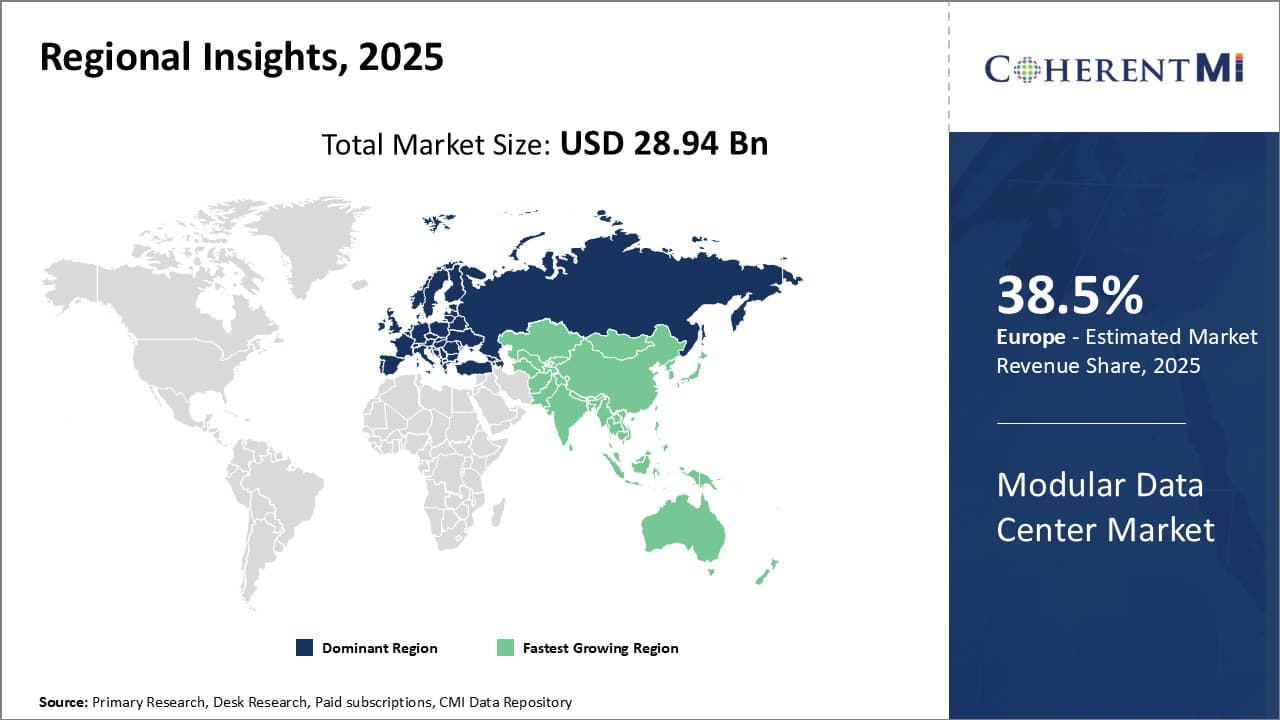モジュラーデータセンター市場 サイズ - 分析
グローバルモジュラーデータセンター市場規模が評価されました US$ 18.49 億 2023 億 そして到達する予定 2030 年までに 87.65 億米ドル、混合の年次成長率で育ちます 24.9%のCAGR 2023年~2030年
モジュラーデータセンターは、スケーラブルなデータセンター容量とクイックデプロイメント用に設計された、プレハブのコンピューティング施設です。 従来のデータセンター上の柔軟性、コスト効率、パワー管理の強化、および無駄なメンテナンスなどの利点を提供します。 モジュラーデータセンター市場の主要なドライバには、コロケーションプロバイダからの需要の増加、エネルギー効率の高いデータセンターの必要性の増加、中小企業による採用の増加、グリーンデータセンターの推進に有利な政府の取り組みが含まれます。
モジュラーデータセンター 市場は部品、データセンターのサイズ、層のタイプ、企業および地域によって分けられます。 コンポーネントによって、市場は機能的なモジュール、データセンターインフラストラクチャ、サービス、およびパワー&冷却モジュールに分けられます。 2022年に最大のシェアを占める機能モジュールセグメント。 ITモジュール、電気モジュール、メカニカルモジュールなどを含みます。 機能モジュールは、モジュラーデータセンターの重要な要素であり、その採用は、市場投入までの時間を短縮し、スケーラビリティを強化するなど、メリットが高まっています。
- スケーラブルでアジャイルなデータセンターの容量に対する需要の拡大: データセンターの容量の需要は、データトラフィックの増加、モノのインターネット(IoT)導入、ビッグデータ分析、クラウドコンピューティングなどの要因によって急速に成長しています。 多くの組織は、コロケーション施設やクラウドプラットフォームにワークロードを移動しています。 これは、スケーラブルでアジャイルなデータセンターの容量の必要性を駆動し、要求の変動に応じて迅速に追加することができます。 モジュラーデータセンターは、プレハブモジュラーアーキテクチャでこの要件を満たしており、迅速な導入と容量の拡大を可能にします。 モジュラー設計により、データセンターの所有者が実際の計算ニーズに基づいてスケールアップまたはダウンすることができます。 この運転者は高められた電力密度、冷却方法、管理ソフトウェア等のようなモジュラー データ センタの革新によって補強されます。
- モジュラーデータセンターは、組織が操業コストを削減し、施設管理の効率性を改善するのに役立ちます。 IT/パワー/冷却インフラを事前に統合し、モジュール化されたデータセンターは導入と継続的な運用を簡素化します。 計画、ラック アセンブリ、ケーブルで縛る、テスト等のために必要な時間そして努力を減らします。 Vendorsは、リーン操作のためのリモート監視ソフトウェアとサービスを提供します。 モジュラーアーキテクチャは、一貫性のある環境を可能にし、ヒューマンエラーを最小限に抑えます。 合理化された管理は組織のための低い操作の支出に変換します。 増加エネルギーコ
- ストで、近代的なモジュラーデータセンターのエネルギー効率の高い設計もユーティリティの費用で再構築するのに役立ちます。
- コンテナ化の採用増加 データセンター: コンテナ化されたデータセンターは、データセンターの機能全体を標準的なインターモーダルコンテナにパックするので、迅速なトラクションを得ることができます。 彼らはクラウドゲームやIoTエッジネットワークなどのコンピュートインテンシブアプリケーションのための迅速な展開、モビリティ、スケーラビリティ、コストメリットを提供します。 コンテナ化されたデータセンターは、精密冷却、火災検出/抑制、冗長性、およびリモートモニタリングで事前に統合されます。 彼らのアップテークは、軍事、災害復旧プロバイダ、鉱山会社、モバイルネットワーク事業者など、簡単に交換可能なデータセンター容量を必要とする組織間で増加しています。
- マイクロデータセンターの普及: マイクロデータセンターは、ITラックエンクロージャ、電力、冷却、セキュリティ、管理ソフトウェアなどを含む、自己完結型システムです。 コンパクトサイズとプラグアンドプレイのデザインは、小売、製造、テレコムなど、縦型でエッジコンピューティングアプリケーションに適しています。 マイクロデータセンターでは、エンドユーザーやIoTデバイスに近い時間感度データを処理できます。 分散資産を持つIT環境の集中型データセンターに関連する帯域幅制約や遅延の問題を克服するため、採用が増加しています。 マイクロデータセンターは、VR/AR、ビデオ分析、自動運転車などの技術のためのローカライズされた処理を加速します。
市場規模(米ドル) Bn
CAGR25.1%
| 調査期間 | 2025-2032 |
| 推定の基準年 | 2024 |
| CAGR | 25.1% |
| 最も急成長している市場 | Asia Pacific |
| 大規模な市場 | North America |
| 市場集中度 | High |
| 主要プレーヤー | ホアウェイ, IBMの, エアトン, ブレードルーム, キャノンテクノロジー その他 |
お知らせください!
モジュラーデータセンター市場 トレンド
- 電力機器の革新により、信頼性が向上しました。 ベンダーは、堅くなる、冗長性、および最大限の可用性のための認定統合を備えたモジュラー電力インフラを提供しています。 たとえば、Deltaはエコパワーモニターを提供して、電力の品質を分析します。 シュナイダーは耐衝撃性媒体の電圧開閉装置を提供します。 Huawei社は、高効率のために1.2未満のPUEを減らすモジュラー液体冷却ソリューションを提供しています。 このような進歩は、現代の常にオンラインアプリケーションを継続するために重要な弾力性、無停電電源を確保しています。
- プレハブデータセンター 利益牽引: 工場の事前統合およびテストによって造られるプレハブのモジュラー データ センタはインペータスを得ます。 それらは加速された配置、制御された環境、最低の間違いおよび一貫した質を約束します。 ST Telemedia、Global Switch、Digital RealtyなどのColoプロバイダは、プレハブ設計を採用しています。 Huawei社のモジュラーデータセンター製品ポートフォリオは、迅速なキャパシティロールアウトのためのプレハブモジュール、IT /パワー/冷却インフラおよび管理ソフトウェアを網羅しています。
- A
- Iとビッグデータ分析は、インテリジェントなリモート監視と管理の合理化を可能にするために、モジュラーデータセンターベンダーによって活用されています。 機械学習アルゴリズムは、ラック条件、気流、湿度レベル、トラック障害パターンなどのパラメータを分析し、将来の異常を予測するのに役立ちます。 これにより、時機応に外出を観察し、予防することができます。 チャットボットは、会話インターフェイスを介してITチームの努力を容易にします。 AIは、モジュラー設備を自動運転するデータセンターに変え、稼働時間とスタッフの生産性を向上させます。
- 革新的な冷却技術および自由な冷却の活用: ベンダーは、ゼロウォーター液体冷却、リアドア熱交換器、封入システム、エビファームなど、モジュラーデータセンター用の最先端の冷却システムを提供しています。 IoTセンサー、予測モデリング、PUE最適化エンジンを活用して、外部の周囲空気を自由に冷却モードで拡大することも可能です。 たとえば、Schneider ElectricのEcoBreezeは、AIを活用して、フリーエアを使用してリアルタイムの冷却調整を行います。 冗長空調を抑えながら最適な冷却を実現します。
モジュラーデータセンター市場地域洞察
- 北アメリカ 2022年の市場シェアの38.5%以上を占める、予測期間中にモジュラーデータセンター市場のための最大の市場であることが期待されます。 北米での市場成長は、先進技術の早期採用、主要なコロケーションとクラウドサービスプロバイダの存在、エッジコンピューティングソリューションへの投資の増加に起因しています。
- インフォメーション ヨーロッパ 市場は2022年の市場シェアの32.1%以上を占めるモジュラーデータセンター市場のための第2位の市場であることが期待されます。 市場の成長は、英国、ドイツ、フランス、オランダから排出に関する厳格な政府規制の要求が高いと見なされます。
- インフォメーション アジアパシフィック 市場は、予測期間中に26.7%以上のCAGRとモジュラーデータセンター市場のための最速成長市場であることが期待されます。 アジアパシフィックの市場拡大は、急速に成長するデータセンターインフラ、クラウドコンピューティングとIoTの採用の増加、中国、日本、インドなどの国におけるデジタル化が進んでいます。
プロフィール 1. グローバルモジュラー データセンター市場シェア(%)、地域別、2023

競合の概要 モジュラーデータセンター市場
Flexenclosure、Houlett Packard Enterprise、Huawei社、IBM、Eaton、Bladeroom、Cannon Technologies、Rittal、Schneider Electric、Vertiv、Baselayer Technology、Cisco、Aceco TI、アクティブパワー、Datapod、ZTE、Commscope Holding、Dellは、モジュラーデータセンター市場における主要な企業です。
モジュラーデータセンター市場 リーダー
- ホアウェイ
- IBMの
- エアトン
- ブレードルーム
- キャノンテクノロジー
モジュラーデータセンター市場 - 競合関係

モジュラーデータセンター市場
(大手プレーヤーが支配)
(多くのプレーヤーが参入し、競争が激しい。)
最近の動向 モジュラーデータセンター市場
モジュラーデータセンター業界は、スケーラブルでエネルギー効率の高いデータストレージソリューションの需要の増加によって駆動され、近年、大幅に成長と革新を目撃しました。 これらのコンパクトで柔軟なデータセンターは、簡単に拡張とカスタマイズが可能で、急速に変化するデジタルランドスケープでビジネスの進化のニーズを満たすことができます。
モジュラーデータセンターの1つの重要な利点は、従来のデータセンターに必要な時間のほんの一部に展開する能力です。 このクイック展開は、迅速なスケーラビリティと作業負荷の変動に対する適応性を求める企業にとって不可欠です。 さらに、モジュラーデータセンターには、高度な冷却とエネルギー管理システムが搭載され、効率性を高め、環境への影響を削減します。
業界は、IT、通信、ヘルスケア、金融など、さまざまな分野における採用の急務を抱えており、高性能コンピューティングおよびストレージ能力の需要が拡大し続けています。 モジュラー・アプローチにより、企業が大規模な投資を必要としないITインフラを最適化し、企業と新興企業の両方にとって魅力的なソリューションを実現することができます。
テクノロジーが進化するにつれて、モジュラーデータセンターは、データストレージの風景の中で重要な役割を果たしていると予想され、変化するデジタル要求の面でアジャイルを維持するために、費用対効果の高い持続可能なソリューションを提供します。 モジュラー設計、エネルギー効率、コネクティビティの継続的な進歩により、モジュラーデータセンター業界は、グローバルなITインフラ市場における継続的な拡大と影響を期待しています。
- 2022年9月、Huawei社は、次世代のフュージョンモジュール式データセンターを立ち上げ、統合、電力密度、信頼性、環境の友好性を高めました。
- 2021年6月、シュナイダーエレクトリックは、エッジコンピューティングアプリケーションのための強化された冷却技術でEcoStruxureマイクロデータセンターCシリーズ43Uを開始しました。
モジュラーデータセンター市場 セグメンテーション
- コンポーネント:
- 機能モジュール
- サービス
- インフラ
- パワー&冷却
- データセンターのサイズ:
- 小・中
- 大きいサイズ
- マイクロ
- 層のタイプによって:
- 層 1 & 2
- 層 3
- 層 4
- 業界別:
- BFSIの特長
- IT&テレコム
- 政府と防衛
- ヘルスケア
- 小売&Eコマース
- 製造業
- その他
- 地域別:
- 北アメリカ
- ヨーロッパ
- アジアパシフィック
- ラテンアメリカ
- 中東・アフリカ

購入オプションを検討しますか?このレポートの個々のセクション?
Suraj Bhanudas Jagtap は、7 年以上の経験を持つ熟練した上級管理コンサルタントです。彼は、Fortune 500 企業や新興企業にサービスを提供し、幅広い事業拡大や市場参入戦略でクライアントを支援してきました。彼は、需要分析、競合分析、適切なチャネル パートナーの特定など、さまざまなクライアント プロジェクトに戦略的な視点と実用的な洞察を提供する上で重要な役割を果たしてきました。
よくある質問 :
モジュラーデータセンター市場の成長を妨げる重要な要因は何ですか?
高い初期投資、ベンダーのロックインの問題、標準化の欠如、社内のデータセンターとの複雑な統合の課題、故障の場合の欠陥の位置、および拡張の限られた柔軟性は、モジュラーデータセンター市場の成長を妨げるいくつかの重要な要因です。
モジュラーデータセンター市場成長を促進する主要な要因は何ですか?
コロケーションプロバイダからの需要を成長させ、中小企業、スケーラビリティ、および容易な導入による採用を増加させるエネルギー効率の高いグリーンデータセンターの必要性を増加させ、モジュラーインフラの革新は、モジュラーデータセンター市場の成長を主導する主要な要因のいくつかです。
モジュラーデータセンター市場における主要なコンポーネントセグメントは?
2022年のモジュラーデータセンター市場における最大のシェアを占める機能モジュールセグメント。
モジュラーデータセンター市場における主要なプレーヤーはどれですか?
モジュラーデータセンター市場で動作する主要なプレーヤーのいくつかは、Huawei社、IBM、Eaton、Dell、Vertiv、Schneider Electric、Hhewlett Packard Enterprise、Cisco、Rittalです。
モジュラーデータセンター市場をリードする領域は?
北米は、予測期間中にモジュラーデータセンター市場における優位性を継続することが期待されます。
モジュラーデータセンターマーケットのCAGRは何ですか?
モジュラーデータセンター 2023-2030年頃に約24.9%のCAGRで市場を成長させる見込み